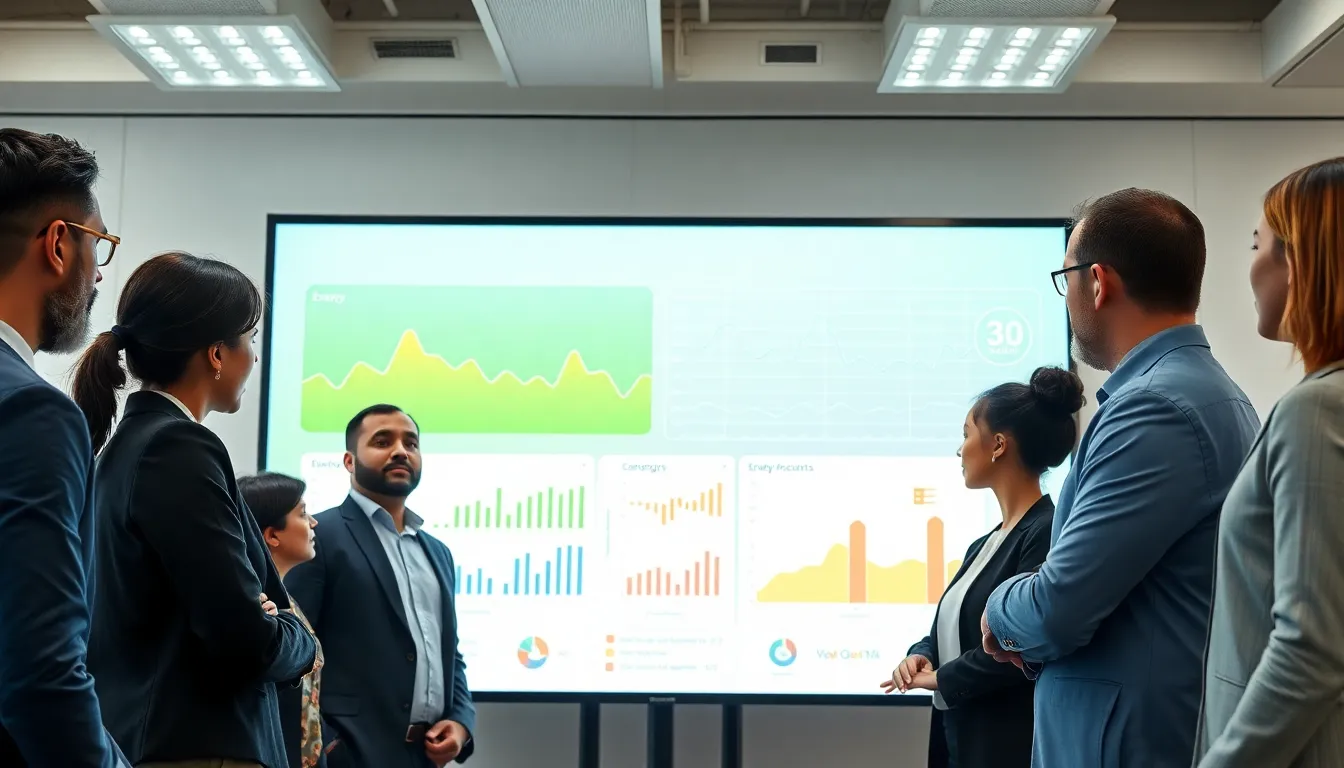In a world increasingly focused on sustainability, smart energy management has emerged as a game-changer. It empowers individuals and businesses to optimize their energy usage, reduce costs, and minimize their carbon footprint. By leveraging advanced technologies and data analytics, smart energy management systems allow for real-time monitoring and control of energy consumption, making it easier than ever to make informed decisions.
As energy demands rise and environmental concerns grow, the need for efficient energy solutions becomes paramount. Smart energy management not only enhances efficiency but also promotes renewable energy integration, paving the way for a more sustainable future. Understanding its benefits and applications can help everyone—from homeowners to large corporations—take meaningful steps toward energy efficiency and environmental responsibility.
Table of Contents
ToggleOverview of Smart Energy Management
Smart energy management incorporates innovative technologies and data analytics to enhance energy efficiency. This approach optimizes energy usage through real-time monitoring, automation, and predictive analytics. Individuals and organizations can track energy consumption patterns, identify inefficiencies, and implement data-driven strategies to reduce waste.
Key components of smart energy management include:
- Smart Meters: Devices that provide detailed insights into energy usage, enabling timely adjustments to consumption habits.
- Energy Management Systems (EMS): Software solutions that analyze energy data to support decision-making and improve operational efficiency.
- Internet of Things (IoT): Connected devices that enable seamless communication across various energy-consuming systems, facilitating integrated energy management.
Benefits of smart energy management extend beyond cost savings. It contributes to environmental sustainability by promoting renewable energy sources, reducing greenhouse gas emissions, and supporting grid reliability. As energy demands rise, the implementation of smart energy management becomes crucial for sustainable development, offering practical solutions that align with modern energy challenges.
Key Components of Smart Energy Management


Smart energy management relies on several essential components that facilitate efficient energy usage and promote sustainability. Understanding these components aids in optimizing energy practices for businesses and residences.
Energy Monitoring Systems
Energy monitoring systems (EMS) track and analyze real-time energy consumption. These systems utilize smart meters to deliver precise data on energy usage patterns. Users can identify peak usage times, detect inefficiencies, and make informed decisions to reduce energy waste. Advanced EMS features include energy analytics and reporting tools, which assist in setting realistic energy goals and benchmarking performance against historical data. These systems empower organizations and homeowners to implement targeted conservation strategies.
Demand Response Technologies
Demand response technologies adjust energy consumption based on supply conditions. These systems enable users to reduce energy use during peak demand periods, contributing to grid stability. Users receive financial incentives for lowering consumption during high-demand times. Automated demand response (ADR) systems enhance efficiency by integrating with building management systems, allowing for seamless adjustments based on real-time energy pricing and availability. This technology supports the integration of renewable energy sources while promoting a more resilient energy grid.
Benefits of Smart Energy Management
Smart energy management delivers substantial advantages for both individuals and organizations. By leveraging technology and analytics, users experience improvements in energy efficiency and sustainability.
Cost Savings
Cost savings represent a significant benefit of smart energy management. Smart meters provide users with real-time data on energy consumption, enabling precise monitoring and control. By identifying energy inefficiencies, users can make informed decisions that decrease energy bills. According to the U.S. Department of Energy, homes utilizing smart energy technologies can save up to 15% on their energy costs annually. Organizations also benefit from reduced operational expenses as energy-efficient practices lead to lower utility bills and decreased maintenance costs associated with outdated systems.
Environmental Impact
The environmental impact of smart energy management extends beyond mere cost reductions. By optimizing energy usage, smart management significantly lowers carbon footprints. The adoption of these technologies supports the integration of renewable energy sources, reducing reliance on fossil fuels. For example, a study by the International Renewable Energy Agency indicates that smart energy solutions can lead to a reduction of greenhouse gas emissions by up to 30% in urban environments. Furthermore, improved grid reliability enhances the overall energy system’s resilience against disruptions, supporting a sustainable energy future.
Challenges in Implementing Smart Energy Management
Implementing smart energy management involves several challenges that can hinder its effectiveness and widespread adoption.
Technological Barriers
Technological barriers impact the deployment of smart energy management systems. Compatibility issues arise when integrating new technologies with existing infrastructure, making installation cumbersome. Data security concerns also pose risks, as the increased connectivity of devices creates vulnerabilities to cyberattacks. Additionally, the requirement for advanced technology skills can limit user adoption, with many potential users lacking the technical expertise necessary for effective implementation. Limited availability and high costs of smart devices can further hinder access, particularly for small businesses and low-income households.
Consumer Awareness
Consumer awareness plays a critical role in the success of smart energy management. Many individuals remain uninformed about the benefits of smart energy solutions and how to utilize them effectively. Misunderstandings regarding the technology’s complexity often discourage potential users from adopting smart systems. Educational initiatives and outreach programs can bridge this knowledge gap, yet many organizations still lack strong strategies to raise awareness. Promoting the advantages, such as cost savings and environmental benefits, can enhance consumer interest and foster broader acceptance of smart energy management practices.
Future Trends in Smart Energy Management
Emerging trends in smart energy management highlight the evolution of energy solutions and technologies. Innovations such as artificial intelligence (AI) and machine learning (ML) are becoming integral in analyzing energy consumption patterns, identifying inefficiencies, and automating management processes. These advancements enable real-time adjustments to energy usage, optimally aligning consumption with availability.
Next-generation energy storage solutions are gaining momentum as well. Enhanced battery technologies, including lithium-ion and solid-state batteries, offer greater capacity and efficiency. These developments facilitate the integration of renewable energy sources, supporting stability in supply to meet demand fluctuations.
Another trend focuses on the expansion of decentralized energy systems. Distributed energy resources (DER), such as solar panels and wind turbines, empower users to generate and manage their energy. This shift reduces reliance on centralized grids and enhances energy resilience.
Moreover, the climate agenda drives increased interest in smart grid technologies. These systems enable two-way communication between utilities and consumers, fostering demand response capabilities and real-time monitoring. Consequently, grids become more adaptive, accommodating diverse energy sources.
Lastly, cybersecurity will remain a priority as energy management technologies become more interconnected. Enhanced data protection strategies will become crucial to safeguard user information and maintain system integrity as interactions with IoT devices amplify.
These trends indicate a vibrant future for smart energy management, characterized by continuous innovation and a commitment to sustainability.
Smart energy management represents a pivotal shift towards a more sustainable future. By leveraging advanced technologies and data analytics, individuals and businesses can significantly enhance their energy efficiency while reducing costs and environmental impact. The integration of smart meters and energy management systems empowers users to make informed decisions about their energy consumption.
As the landscape of energy management continues to evolve, embracing these innovative solutions will be essential for tackling the challenges of rising energy demands and climate change. With ongoing advancements in technology and increasing awareness, smart energy management can play a crucial role in creating a resilient energy ecosystem that benefits everyone.



